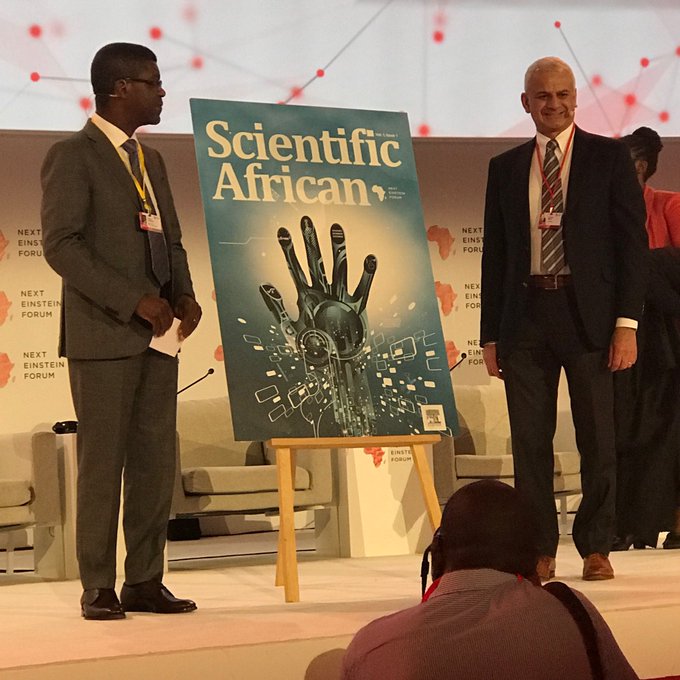Scientific African, a new pan-African journal will provide a voice for African scientists
CBC Radio ·
Scientific African was launched earlier this month at the Next Einstein Forum in Kigali, Rwanda. (Next Einstein Forum/Facebook)
African scientists, often overlooked by Western publications, hope a new journal will put their work on par with their global colleagues.
Scientific African is billed as a peer-reviewed, multidisciplinary journal featuring research from across Africa. It will focus on research specific to the continent and will offer open access with no subscription required. The first issue is set to come out later this year.
While Scientific African isn't the first publication dedicated to science on the continent, proponents believe it could reach the same prestige as well-known American and European journals like Science and Nature.
"Symbolically, it's crucial to show that we have a platform where exceptional science from Africa is being is being showcased," said Rose Mutiso.
The Nairobi, Kenya-based CEO of The Mawazo Institute told As It Happens host Carol Off that she believes highlighting untapped talent across the continent will elevate Scientific African in global science circles.

Rose M. Mutiso is CEO of the Mawazo Institute based in Nairobi, Kenya. (Supplied by Rose Mutiso)
'It's not a priority in the West'
Whether or not studies make it into journals comes down to priorities, Mutiso said.
In the West, studies are published — and funded — based on priorities close to home, she said.
Cancer research, for example, is "massive" in North America and Europe, she said. Meanwhile, funding for research on tropical diseases in African countries is harder to secure.
"These are diseases that are so cheap to treat, but the science has not moved on it because it's not a priority in the West."
The effect climate change is having on food crops is similarly ignored, she said. This new journal, Mutiso believes, could re-prioritize the issue.
"If there's a platform for scientists locally to discuss and publish information about those crops, those past diseases, then that kind of advances food security issues here."
"I think soon we'll be seeing Western scientists wanting to learn from the scientists in Africa".
- Rose Mutiso
Increasingly, these issues are becoming relevant in other parts of the world as climate change alters the environment. A prestigious publication, as Scientific African hopes to be, could make that research — from scientists who know the region best — more broadly available.
"I think soon we'll be seeing Western scientists wanting to learn from the scientists in Africa," Mutiso said.
More citations needed
If priorities are a barrier to publication, they're a brick wall when it comes to funding.
Without buy-in from governments, agencies or organizations, research projects don't get off the ground.
Mutiso worries that's preventing African scientists from gaining the experience they need to contribute to the broader scientific community.
"You have to exist in this ecosystem where you are supported as a scientist," she said. "Many Africans do not even get to the point where they have something publishable."
Research cannot exist "in a vacuum," she said. But without citations, it's difficult for a researcher to justify their work.
"Publishing is an important rite of passage if you're an academic or researcher," said Mutiso. "This is how your work enters the public domain."
Making publication accessible
Scientific African hopes to combat the lack of publications by African researchers, at least partially, by lowering publication costs.
According to the Guardian, it will cost around $200 to put forward a study for peer-review. That's half of typical journals.
Doing so, editor Benji Gyampoh told the Guardian, the journal will "[provide] a platform for world-class research, across different disciplines and on par with any published around the world."
Mutiso admits that it could be difficult to attract researchers away from well-known publications and to Scientific African. She said it's a challenge that other groups will face as well.
"We don't have a Chinese version of Science or Nature in terms of prestige," said Mutiso, referring to two prominent scientific journals. "This hegemony has not been challenged yet."
Yet for Mutiso, there's an easy way forward.
"What would be really useful for Scientific African to do is to tap into the talent pool [across Africa] as opposed to competing with the prestigious journals," she said.
"You can build up the capacity here and then publish those people and build your reputation that way."
Written by Jason Vermes. Interview produced by Julian Uzielli.

No comments:
Post a Comment